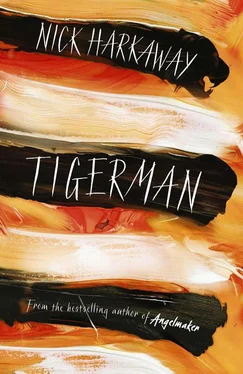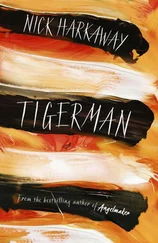He would draw the line first of all for Pavel Ygorovitch Pechorin, personally, in a manner appropriate to the sin.
‘Tigerman,’ he gritted out. ‘Whoomf.’
ON GRASPING THE Sergeant’s intention the boy had been almost incandescent with delight. The word ‘win’ had filled his mouth and for several long minutes he had seemed unable to say anything else. Then he explained in a whisper that the plan was composed entirely of awesome. It was made and designed by the House of Awesome, from materials found in the deep awesome mines of Awesometania and it would be recorded in the Annals of Awesome — and nowhere else, because any other book would catch fire and explode from the awesome — and by its awesomeness it would be known from now until the crack of doom.
Then abruptly he had sobered and applied himself to the matter, eyes alight not with enthusiasm but with that almost eerie intensity of thought which occasionally marked him out from the crowd. He ran off with promises of a speedy return, and an hour later he was indeed back with an actual suitcase full of comics, the muscles straining in his narrow arms as he hauled it across the gravel of Brighton House: the rest of his trove, the Sergeant assumed, fetched out of whatever hiding place to meet the need of the hour. ‘My library,’ the boy agreed.
‘Library?’
‘Sure,’ the boy said. ‘Wood and brass, velvet armchairs. Many floors underground in my secret volcano base. I drink brandy, wear a smoking jacket. Take over the world. Because: that’s how I roll, dude.’
‘Oh,’ the Sergeant said. ‘Right.’ His mind’s eye pictured a shed or a cellar like the one he had co-opted for his own use long ago — it really was way back now, three decades gone — hung with spare blankets and scattered with books, cushions, chewy sweets and battery-powered torches. Later he had added a radio and thought himself rich. He wanted to ask more, to reminisce and share that fragment of himself, but as so often when he tried to say something ordinary to the boy he couldn’t find the words, and anyway it was the wrong time.
When the boy unclipped the fastenings on the case and threw back the lid, glossy nightmares slithered out onto the floor: tentacled things in suits reached for appalled plucky girl reporters; dogs barked at half-transformed wolfmen; nameless creatures crawled from the ocean towards sleeping fisher towns. The next level down featured more conventional heroes fighting strange enemies, inhabitants of horror stories briefly making uncomfortable appearances in the primary-colour worlds of the Justice League or the Avengers before skulking back where they belonged. Below that, the boy’s energetic scrabbling revealed a remarkable collection of true stories, or stories which were said by those relating them to be true: the Mothman, the Yeti, the Chupacabra and the Ozark Howler, and sundry tales of people being taken to alien places or deserted houses by entities too strange to understand.
From this landscape and palette they derived a mood, a sense of foreboding and intrusion. The theme was never being safe, and above all never being safe in isolation. In these stories, the boy said, if you wanted to be the hero you had to stand alone, but when you were alone was also when you might get eaten by the monster.
‘First it is seen,’ the boy explained, waving his hands at the edge of his vision, ‘here. And then there are more and more warnings, and they are ignored. Always, in daylight, the warnings are funny. They come from someone a little silly, maybe. And finally it walks in the night and everything is terrible.’
The interesting thing, to the Sergeant, was how these stories were at least in one way quite true to life: you didn’t know whether you were the hero or not until the end, because at any time up to that moment you could just get eaten and the rest would be about someone else. In fact you were never safe, because sometimes the monsters won.
From patches and scraps they stitched a skittering cockroach blanket and left it out for Mancreu to find.
The following morning, the fourth since Shola’s death, the Sergeant carefully assembled his face and manner into an attitude of amiable vagueness. It was difficult, requiring constant attention. If his focus wandered, his shoulders tightened and his mouth slipped into the sneer he recognised from the first day of deployment to an active theatre. But it was necessary for what came next that he should appear benign to the point of risible, so he thought about what Shola would say to this new plan, and played his part.
‘You’re quite out of your mind, Lester, you know that?’
‘Yes, Shola, I do.’
‘I mean, seriously, my friend: this is a terrible idea.’
‘So you like it.’
‘I love it. But that does not make it smart.’
‘You want to come?’
‘I’ll watch from a safe distance, I think. But you go ahead and have fun. Give Marie a hug for me, Lester. She’s not doing well.’
But that was too close to home, and he hurriedly put the vision away, then composed a hazy smile and ambled through the streets of Beauville with his customary pleasantness. He greeted the people and gossiped, accepted their condolences and their respect, and took his ease. Wherever he went he allowed the conversation to follow its own course, to wind and meander. That sort of chatter, on Mancreu, inevitably tended to swapping gossip and rumour, and where it seemed appropriate he would laugh and mention the demon, just in passing. Then — if someone asked ‘What demon?’ which they mostly did — he would explain and laugh some more. If he laughed too hard, well, he was a man who had lost a friend, and he could be allowed to find humour where he might. If it didn’t come up, then, well, that was fine too.
He told farmers he’d heard the story from stevedores, drovers he had it from seamstresses, bakers it came from lobstermen. Always he dismissed it out of hand, even as he spiced the pot with alarming details: the hint of missing persons, the flavour of doubt and poorly concealed official concern. He sought reassurances: ‘Oh, so you have seen Old Père Lipton? Good, all right, then he’s fine,’ as if crossing a potential victim off a list in his head. When pressed, he would explain that there were concerns about a real monster behind the story, a ghoul in the night. He didn’t outright say that it might be a human being so warped by the Discharge Clouds that he had become something other. He let the notion bubble up. He was jaunty, and called the whole thing a ghost story, nothing worth thinking about. And then in parting he would drop a reference to someone who was still missing. Every so often he sealed the deal with an earnest ‘There’s really no cause for alarm.’
It was so easy, he felt a little ashamed. You could have done it anywhere, in any village in the world. At a pub near Hereford, he remembered, an earnest matron had told him in great seriousness that windmills caused cancer, and the government was covering it up. A man from the Spectator , she said, had come and given a lecture. When the Sergeant had begun to express doubt, the whole saloon bar had laughed at him for his credulity. Myths and monsters were a human weakness, even in places not about to be evacuated and sterilised by fire.
The boy meanwhile had let the story slip to the card-players, who inevitably handed it on to passers-by and friends, and the legend grew in the telling so that one lonely ghost became a host led by an appalling demon prince. Inoue was right, apparently: the mountain people, in particular, had a lot of demons — although the fishermen had more than enough to be going on with, rising up from the frozen deep-water hell.
The boy had moved on to the waterfront and idled with the net-menders and the basket-weavers, run errands for the Portmaster. If he mentioned along his way the matter of the disappearances, the ones NatProMan was covering up, well, he could hardly be blamed. He was a child, and, after all, everyone was talking about it.
Читать дальше
Конец ознакомительного отрывка
Купить книгу











